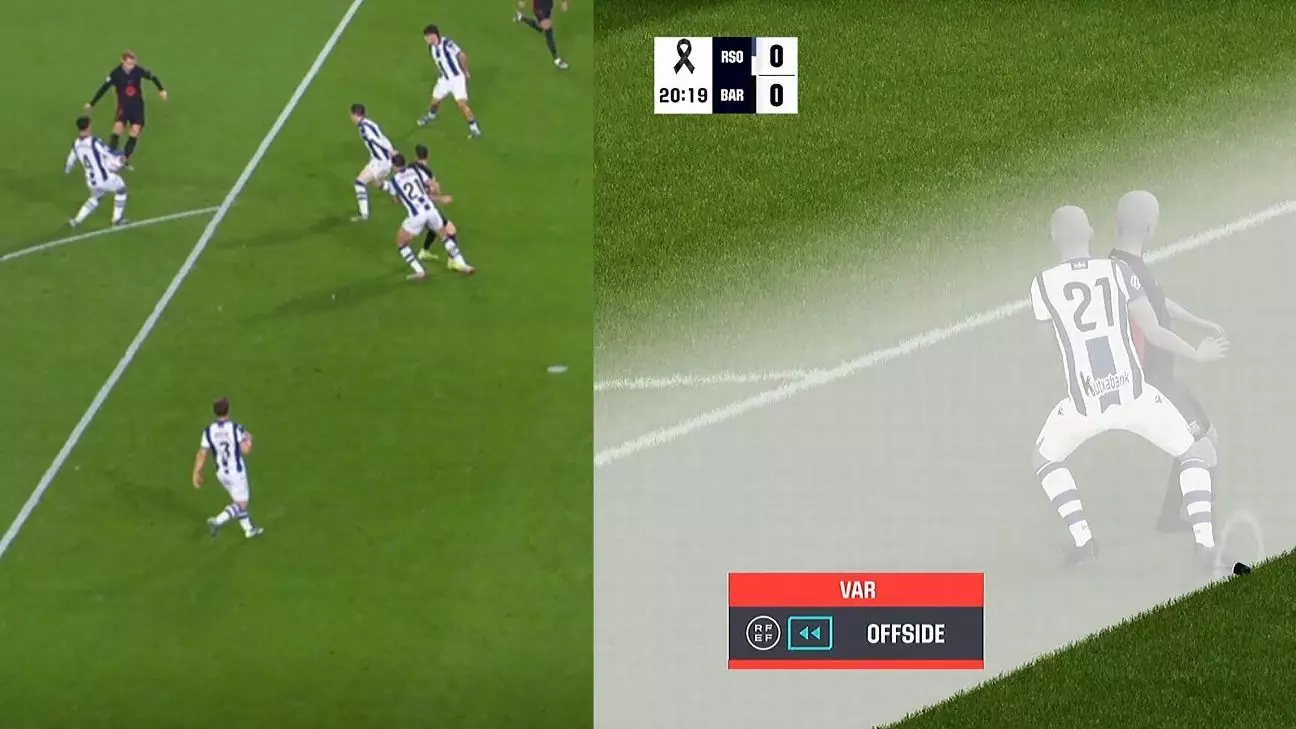In the fast-paced world of professional football, the precision of officiating can culminate in pivotal moments that sway the outcome of a match. The recent controversy surrounding Robert Lewandowski’s disallowed goal in Barcelona’s 1-0 defeat against Real Sociedad stands as a testament to the ongoing issues surrounding the offside rule and the technology intended to enhance its accuracy. When Lewandowski’s goal was ruled out due to a narrow offside determined by semi-automatic VAR (SAOT) technology, it has ignited a conversation among fans, players, and officials about the efficacy and reliability of modern officiating methods.
Deco, Barcelona’s sporting director, voiced his need for clarity regarding the decision-making process that led to Lewandowski’s goal being annulled. His statement reflects wider sentiments shared by many in the football community, calling for transparency in the technology that is becoming increasingly integral to match officiating. The advancement of technology in sports, particularly in football, aims to reduce human error, yet as we see, it has introduced new layers of complexity to an already contentious issue.
The introduction of VAR aimed to address significant mistakes in officiating; however, as Deco pointedly remarked, the technology has not entirely fulfilled its promise. He challenges the notion that VAR serves as a complete solution to officiating problems, highlighting that discrepancies in judgment remain. Deco’s perspective is echoed by many who feel that even with sophisticated technology at their disposal, referees still exhibit bias or subjectivity when making pivotal calls.
The VAR system, and particularly the semi-automatic variant, utilizes multiple tracking cameras that analyze player positions with remarkable precision. This quantifiable viewpoint aims to create clearer delineations between onside and offside positions. However, in moments where the margin for error is heightened, such as the instance involving Lewandowski, the obsession with fractionally assessing players’ positions results in frustration for fans and advocates of the sport.
Deco’s analogy about the confusion surrounding semi-automatic technology illustrates a fundamental issue — clarity in communication about how these systems work and how rulings are made. When the differences between “automatic” and “semi-automatic” remain convoluted, it breeds a mistrust in the system. The reliance on technology must be paired with a robust framework that explains how and why decisions are made; otherwise, critical moments in matches are subjected to a cloud of ambiguity.
Beyond the ramifications of technologies like VAR, the disallowed goal has raised concerns about its impact on team morale and dynamics. Barcelona’s coach, Hansi Flick, deemed the decision a “huge mistake” indicative of a broader issue in officiating standards. The team’s defeat not only impacts their standing in La Liga but also their internal confidence and cohesion.
Equally significant is the absence of young talent Lamine Yamal, which Deco pointed out as detrimental to Barcelona’s strategy. The teen’s development parallels some expectations set by football legends such as Lionel Messi, a comparison Deco acknowledges but cautions against emphasizing too heavily. Yamal’s unique talent should be seen as an asset in a broader scheme of rebuilding the team rather than a blueprint based on past heroes.
Deco’s reflections emphasize that the team is in a transitional phase, facing challenges that require patience and resilience. The loss without Yamal highlighted the magnitude of his influence on the field; hence, presuming continued underperformance during his absence might exacerbate whispers of inconsistency within the club. The young player represents not merely a symbol of hope but also a strategical pivot for Barcelona’s broader future in a rapidly evolving league landscape.
As modern-day football grapples with these controversies centered around offside technology, it becomes vital for governing bodies to reassess the operational mechanics of these systems. The insistence on absolute precision must correlate with a more pragmatic understanding of real-world implications for coaches, players, and fans alike.
It is crucial to establish a thorough review process to address the challenges that arise from technology-assisted decisions while ensuring that human judgment retains relevance. Drawing from Deco’s statements, transparency and communication will remain essential moving forward. As teams like Barcelona advocate for clearer guidelines and corrections, they symbolize a collective desire for better standards within the sport.
Till then, football enthusiasts globally will remain caught in the crossfire of technology’s relentless march toward perfection and the spontaneous spirit that defines the beautiful game. The stadiums, imbued with emotion and rivalry, deserve clarity that enhances their experience rather than diminishes it through misunderstanding and frustration.
